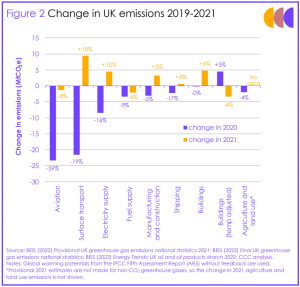Britain’s path to net zero is being imperilled by the Johnson’s government’s over-reliance on long-term targets, market mechanisms, unproven new technology’, and not enough detailed plans to deliver on its praiseworthy legal commitments.
Independent scientific advisors on the Climate Change Committee this morning called for more detailed action by government.
“This government has the right aims, but it won’t be believable until it has the policies to deliver them” said CCC chair Lord Deben, launching the report.
“Without more detail, we will not reach Net Zero,” the peer declared.
The scientists say government urgently needs to address Britiain’s rising cost of living crisis, aligning government alleviations with Net Zero progress. An urgent need for equivalent action exists to reduce demand for fossil fuels and limit energy bills.
They point to slow progress in joined-up thinking in Whitehall. “The Net Zero Strategy contained warm words on many of the cross-cutting enablers of the transition, but there has been little concrete progress”, the report says.
Chief sources worry for the scientists include inadequate plans to insulate the UK’s homes and buildings, source of around 25% of the nation’s carbon. New efficiency projects have collapsed 90% to under 100,000 last year, against over 1 million in 2018.
Two rounds of mass home insulation under Conservative premiers Cameron and Johnson have collapsed in failure, under pressure from their chancellors.
“You can always find excuses to put off the expenditure. But in the end the science cannot be denied”, said Baroness Alison Brown, head of the CCC’s adaptation panel, at this morning’s launch.
Across the UK economy, carbon emissions rose 4% last year on 2020, as the economy began to recover from the COVID-19 pandemic. Emissions from buildings rose a net 2%. See graphic below.

With over 300 recommendations for sectors of British society and economy, 37 of them priorities, today’s 600-page report is the most extensive of three already issued by the CCC.
“It’s delivery time: CEO Chris Stark”
The scientists have developed a new monitoring mechanism, designed to track progress of real change by businesses, consumers, households and government.
Structured around the interaction of policies, enabling and contextual factors, and how they shape outcomes in each sector, the mechanism shifts the committee into monitoring delivery, and away from calculating area-by-area emissions cuts.
Priorities in electricity supply, says the committee, include the government publishing
- This year a strategy to speed up interconnection of offshore wind farms
- By next March a detailed strategy on how to achieve 95% renewables in the UK power mix by 2030
- next year, its market design for a full de-carbonised power sector by the 2030, as promised under the Electricity Market Arrangements
- On networks, a comprehensive list of changes needed to implement Net Zero, including ways to finance, consent and deliver the improvements
- start this year consulting industry on necessary standards for monitoring carbon in imported energy and selected products
Committee chair Lord Deben and chief executive Chris Stark stressed that, though Britain talks an apparently good game with a first mover advantage among nations in setting reductions goals backed in law and with mid-term milestones for cuts, too often important policies were absent.
“We want these monitoring maps to become common currency. They’re open for use, consultation and advice by everyone”, said the CCC head.
Read the full CCC report here.




